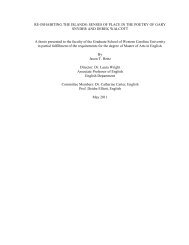SUMMERS, KAREN CRADY, Ph.D. Reading Incest - The University ...
SUMMERS, KAREN CRADY, Ph.D. Reading Incest - The University ...
SUMMERS, KAREN CRADY, Ph.D. Reading Incest - The University ...
You also want an ePaper? Increase the reach of your titles
YUMPU automatically turns print PDFs into web optimized ePapers that Google loves.
96<br />
willingness to sacrifice the lives of others to get what he wants. Only at the last minute<br />
does the plot veer from this path. <strong>The</strong> comic ending and happy resolution is made<br />
possible by the absolute suppression of female sexuality and the reaffirmation of<br />
patriarchy. In brief, the storyline is that Arbaces, king of Iberia, has won his battle<br />
against Tigranes, king of Armenia. Because the defeated Tigranes was still a noble<br />
character, and to encourage peace between the lands, Arbaces declares that he will give<br />
his beautiful sister Panthea in marriage to Tigranes. When the company returns to Iberia,<br />
Panthea approaches her brother, whom she has not seen for a dozen years, to welcome<br />
him home. He does not recognize her as an adult, immediately falls in love with her, and<br />
begins to deny privately and publicly that she is his sister. Inwardly, though, he feels the<br />
guilt of incest, which causes his emotions to wax to extremes. He orders Panthea<br />
imprisoned yet hears her admit that she loves him, too. Finally his lust threatens to<br />
overwhelm him and he vows to rape Panthea and kill himself.<br />
Arbaces’ angst builds for most of the play. He struggles between good and evil as<br />
he tries to avoid temptation, vacillating between his unnatural desire for his sister and his<br />
fear of the consequences of committing incest. But it is not only for himself that he is<br />
afraid, because he knows that acting on his desire would damn Panthea, too. Finally,<br />
though, even with the full knowledge of right and wrong, he is unable to refrain from<br />
committing the sin. Arbaces is “beset with personal ambition, yet frustrated by it; he is<br />
also filled with thoughts of self-deification. With these qualities, Arbaces is behaving<br />
very much like James” (Wilkinson 357). On his return home from long wars Arbaces<br />
displays his foe and prisoner, Tigranes, to his people and tell them that this capture has
















